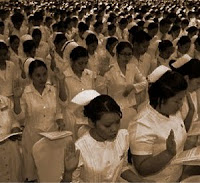Is "Brother" Armin Luistro a moron?
 That's pretty much the question esteemed blogger Rom attempts to answer in her recent blog. She refers to the Philippine Government proposal to extend basic public education by two additional years for a total 12-year "basic education cycle" which effectively increases the financial burden of supporting kids through an additional two years of unemployed dependence (in principle) on both the average Filipino family and the public eduation system.
That's pretty much the question esteemed blogger Rom attempts to answer in her recent blog. She refers to the Philippine Government proposal to extend basic public education by two additional years for a total 12-year "basic education cycle" which effectively increases the financial burden of supporting kids through an additional two years of unemployed dependence (in principle) on both the average Filipino family and the public eduation system.Quite simply it is a simple business case principle that Department of Education Secretary Armin Luistro fails to address -- Return on Investment -- as Rom observes:
Note that [Luistro] doesn't explain why a twelve-year cycle is better; just that it's what everybody else is doing. Note that he doesn't explain what the two extra years will be for. About the only thing I know for that two-year extension is that they are planning to include vocational courses meant to provide high school students with "practical livelihood skills."
Even more bizarre, Luistro serves as Chief Executive Officer of the immensely profitable De La Salle Philippines Incorporated. I wonder what sort of investment decision making does the Chief of De La Salle Inc apply to ensure that his shareholders' wallets remain happy?
In short, Business Management 101 "Brother" Luistro:
Where is the value proposition associated with the incremental cost of introducing two more years of basic education?
Show us the money. What does the Average Pinoy Schmoe get for the additional two years?




That's a fair question, but...
ReplyDelete"Because it's what everybody else is doing," is an absolutely legitimate answer to it, if it is an answer given in the context of bringing the accreditation of Philippine-derived diplomas/certificates/educational credits up to international standards.
The 12-year education cycle is a must, and is one of the few good ideas to come out of the new administration. Absolutely, there must be a clear -- and clearly explained -- plan for what to do with those two added years, but the current truncated education cycle is one of the big reasons why a Philippine education...well, sucks, and is not favorably accepted elsewhere. The shortfall in the actual amount of learning material that is not absorbed because school ends too soon for Pinoy kids is one thing; the fact that they are leaving high school and presumably entering the adult world as under-educated and immature individuals two years younger than the rest of their global peer group is another.
Sure, there's got to be a lot more clarified; just adding two years and leaving everything else as it is won't really help much. But the "financial burden" argument is a total fallacy. Consider the ROI perspective of either sucking it up and supporting two more years of education (assuming those two years are filled in a practical manner), or getting the short-term financial break, and then supporting an unemployed or unemployable and under-educated able-bodied adult over the long term. Which makes more sense?
Yeah, the value proposition needs to be better-pitched, I suppose. Without a clear one to give the the proposal a third leg, it easily falls over on the 'additional burden' argument.
ReplyDeleteWhere I went to school, we had "prep" and Grade 7 in elementary school. So with 4 years hi-school, that's 12 years in total. That made us among the oldest freshmen in UP. It's the experience of being humbled by all these grads of Philippine Science who were 1 or 2 years younger than us that even as early as that time already got me questioning those two additional years.
But then UP is not exactly representative of the Philippines, and certainly not Philippine Science Hi-School...
I don't think it's actually possible to implement this, at least, not anytime soon. Additional 2 years = more teachers, schools, buildings, classrooms, books, chairs, and much more. How can you expect Noynoy's administration to do all that when we can't even provide for our normal shortened cirriculum? We first have to improve the quality of our current education before adding 2 more years.
ReplyDelete